Colony
In political science, a colony is a territory subject to a form of foreign rule.[1] Though dominated by the foreign colonizers, colonies remain separate from the administration of the original country of the colonizers, the metropolitan state (or "mother country"). This administrative colonial separation makes colonies neither incorporated territories, nor client states. Some colonies have been organized either as dependent territories that are not sufficiently self-governed, or as self-governed colonies controlled by colonial settlers.
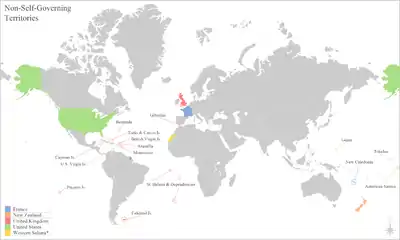
The concept of a colony is derived from the ancient Roman colonia, which in turn was based on the apoikia (Ancient Greek: ἀποικία, lit. 'home away from home'), referring originally to territories (usually relatively small urban areas) settled by ancient Greek city-states. The city that founded such a colony became known as its metropolis ("mother-city"). Since early-modern times historians, administrators and political scientists generally use the term "colony" to refer mainly to the many different overseas territories of particularly European states between the 15th and 20th century CE, with colonialism and decolonization as corresponding phenomena.
While colonies often developed from trading outposts or territorial claims, such areas do not need to be a product of colonization, nor become colonially organized territories.
Some historians use the term informal colony to refer to a country under the de facto control of another state, although this term is often contentious.
Etymology
| Look up colony in Wiktionary, the free dictionary. |
The word "colony" comes from the Latin word colōnia, used as concept for Roman military bases and eventually cities. This in turn derives from the word colōnus, which was a Roman tenant farmer.
The terminology is taken from architectural analogy, where a column pillar is beneath the (often stylized) head capital, which is also a biological analog of the body as subservient beneath the controlling head (with 'capital' coming from the Latin word caput, meaning 'head'). So colonies are not independently self-controlled, but rather are controlled from a separate entity that serves the capital function.
Roman colonies first appeared when the Romans conquered neighbouring Italic peoples. These were small farming settlements that appeared when the Romans had subdued an enemy in war. Though a colony could take many forms, as a trade outpost or a military base in enemy territory, such have not been inherently colonies. Its original definition as a settlement created by people migrating from a central region to an outlying one became the modern definition.
Settlements that began as Roman colonia include cities from Cologne (which retains this history in its name), Belgrade to York. A tell-tale sign of a settlement within the Roman sphere of influence once being a Roman colony is a city centre with a grid pattern.[2]
Ancient examples
- Carthage formed as a Phoenician colony
- Cadiz formed as a Phoenician colony
- Cyrene was a colony of the Greeks of Thera
- Sicily was a Phoenician colony
- Sardinia was a Phoenician colony
- Marseille formed as a Greek colony
- Malta was a Phoenician colony
- Cologne formed as a Roman colony, and its modern name refers to the Latin term "Colonia".
- Kandahar formed as a Greek colony during the Hellenistic era by Alexander the Great in 330 BC.
Modern historical examples
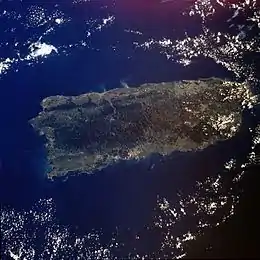
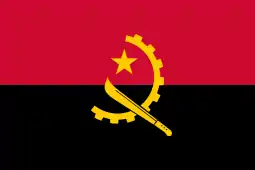 Angola: a colony of Portugal from the 16th century to its independence in 1975.
Angola: a colony of Portugal from the 16th century to its independence in 1975. Argentina gained its independence from Spain in 1810.[4]
Argentina gained its independence from Spain in 1810.[4].svg.png.webp) Australia was formed as a British Dominion in 1901 from a federation of six distinct British colonies which were founded between 1788 and 1829.
Australia was formed as a British Dominion in 1901 from a federation of six distinct British colonies which were founded between 1788 and 1829.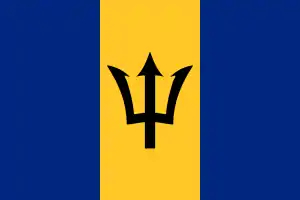 Barbados: was a colony of Great Britain important in the Atlantic slave trade. It gained its independence in 1966.
Barbados: was a colony of Great Britain important in the Atlantic slave trade. It gained its independence in 1966. Brazil: a colony of Portugal since the 16th century. Independent since 1822.
Brazil: a colony of Portugal since the 16th century. Independent since 1822..svg.png.webp) Canada: was colonized first by France as New France (1534-1763) and England (in Newfoundland, 1582) then under British rule (1763–1867), before achieving Dominion status and losing "colony" designation.
Canada: was colonized first by France as New France (1534-1763) and England (in Newfoundland, 1582) then under British rule (1763–1867), before achieving Dominion status and losing "colony" designation.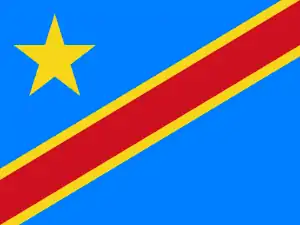 Democratic Republic of the Congo: a colony of Belgium from 1908 to 1960; previously under private ownership of King Leopold.
Democratic Republic of the Congo: a colony of Belgium from 1908 to 1960; previously under private ownership of King Leopold..svg.png.webp) French Indochina was formed in October 1887 from Annam, Tonkin, Cochinchina (which together form modern Vietnam) and the Kingdom of Cambodia; Laos was added after the Franco-Siamese War in 1893. The federation lasted until 1954. In the four protectorates, the French formally left the local rulers in power, who were the Emperors of Vietnam, Kings of Cambodia, and Kings of Luang Prabang, but in fact gathered all powers in their hands, the local rulers acting only as figureheads.
French Indochina was formed in October 1887 from Annam, Tonkin, Cochinchina (which together form modern Vietnam) and the Kingdom of Cambodia; Laos was added after the Franco-Siamese War in 1893. The federation lasted until 1954. In the four protectorates, the French formally left the local rulers in power, who were the Emperors of Vietnam, Kings of Cambodia, and Kings of Luang Prabang, but in fact gathered all powers in their hands, the local rulers acting only as figureheads.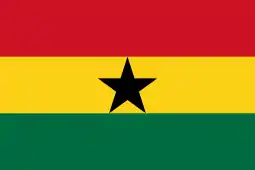 Ghana: Contact between Europe and Ghana (known as The Gold Coast) began in the 15th century with the arrival of the Portuguese. This soon led to the establishment of several colonies by European powers: Portuguese Gold Coast (1482–1642), Dutch Gold Coast (1598-1872), Swedish Gold Coast (1650-1663), Danish Gold Coast (1658-1850), Brandenburger and Prussian Gold Coast (1685-1721) and British Gold Coast (1821-1957). In 1957, Ghana was the first African colony south of the Sahara to become independent.
Ghana: Contact between Europe and Ghana (known as The Gold Coast) began in the 15th century with the arrival of the Portuguese. This soon led to the establishment of several colonies by European powers: Portuguese Gold Coast (1482–1642), Dutch Gold Coast (1598-1872), Swedish Gold Coast (1650-1663), Danish Gold Coast (1658-1850), Brandenburger and Prussian Gold Coast (1685-1721) and British Gold Coast (1821-1957). In 1957, Ghana was the first African colony south of the Sahara to become independent.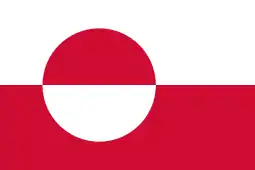 Greenland was a colony of Denmark-Norway from 1721 and was a colony of Denmark from 1814 to 1953. In 1953 Greenland was made an equal part of the Danish Kingdom. Home rule was granted in 1979 and extended to self-rule in 2009. See also Danish colonization of the Americas.
Greenland was a colony of Denmark-Norway from 1721 and was a colony of Denmark from 1814 to 1953. In 1953 Greenland was made an equal part of the Danish Kingdom. Home rule was granted in 1979 and extended to self-rule in 2009. See also Danish colonization of the Americas.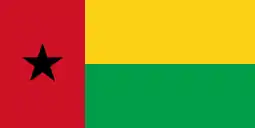 Guinea-Bissau: a colony of Portugal since the 15th century. Independent since 1974.
Guinea-Bissau: a colony of Portugal since the 15th century. Independent since 1974.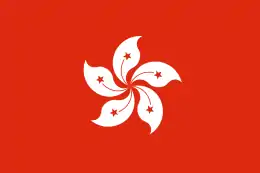 Hong Kong was a British colony (from 1983 British Dependent Territory) from 1841 to 1997. Is now a Special Administrative Region of China.
Hong Kong was a British colony (from 1983 British Dependent Territory) from 1841 to 1997. Is now a Special Administrative Region of China.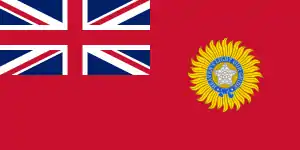 India was an imperial political entity comprising present-day India, Pakistan, Bangladesh, Myanmar and the United Arab Emirates with regions under the direct control of the Government of the United Kingdom from 1858 to 1947. From the 15th century until 1961, Portuguese India (Goa) was a colony of Portugal. Pondicherry and Chandernagore were part of French India from 1759 to 1954. Small Danish colonies of Tharangambadi, Serampore and the Nicobar Islands) from 1620 to 1869 were known as Danish India.
India was an imperial political entity comprising present-day India, Pakistan, Bangladesh, Myanmar and the United Arab Emirates with regions under the direct control of the Government of the United Kingdom from 1858 to 1947. From the 15th century until 1961, Portuguese India (Goa) was a colony of Portugal. Pondicherry and Chandernagore were part of French India from 1759 to 1954. Small Danish colonies of Tharangambadi, Serampore and the Nicobar Islands) from 1620 to 1869 were known as Danish India.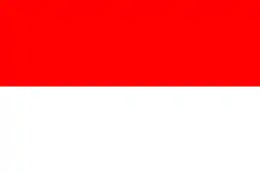 Indonesia was a Dutch colony which differs in each region, but gain full independence as a whole nation in 1945.
Indonesia was a Dutch colony which differs in each region, but gain full independence as a whole nation in 1945.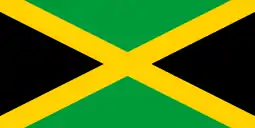 Jamaica was part of the Spanish West Indies in the sixteenth and seventeenth centuries. It became an English colony in 1655; independence in 1962.
Jamaica was part of the Spanish West Indies in the sixteenth and seventeenth centuries. It became an English colony in 1655; independence in 1962.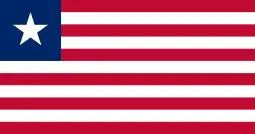 Liberia a colony set up in 1821 by American private citizens for the migration of African American freedmen. Liberian Declaration of Independence from the American Colonization Society on July 26, 1847. It is the second oldest black republic in the world after Haiti.
Liberia a colony set up in 1821 by American private citizens for the migration of African American freedmen. Liberian Declaration of Independence from the American Colonization Society on July 26, 1847. It is the second oldest black republic in the world after Haiti.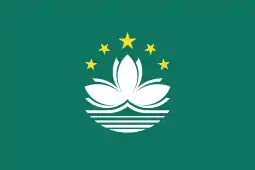 Macau was a Portuguese colony (from 1976 a "Chinese territory under Portuguese administration") from 1557 to 1999. In 1999, two years after Hong Kong, it became a Special Administrative Region of China.
Macau was a Portuguese colony (from 1976 a "Chinese territory under Portuguese administration") from 1557 to 1999. In 1999, two years after Hong Kong, it became a Special Administrative Region of China. Malta was a British protectorate and later a colony from the French Revolutionary Wars in 1800 to independence in 1964.
Malta was a British protectorate and later a colony from the French Revolutionary Wars in 1800 to independence in 1964.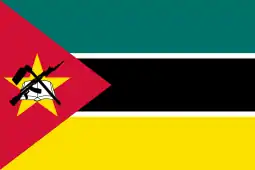 Mozambique: a colony of Portugal since the 15th century. Independent since 1975.
Mozambique: a colony of Portugal since the 15th century. Independent since 1975. Philippines, previously a colony of Spain from c. 1565[6] to 1898 as part of the Spanish East Indies, was a colony of the United States from 1898 to 1946. Achieved self-governing Commonwealth status in 1935; independent in 1946.
Philippines, previously a colony of Spain from c. 1565[6] to 1898 as part of the Spanish East Indies, was a colony of the United States from 1898 to 1946. Achieved self-governing Commonwealth status in 1935; independent in 1946.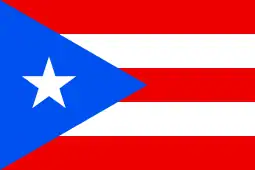 Puerto Rico has been a colony of Spain from 1493 to 1898 and of the United States from 1898 to the present.
Puerto Rico has been a colony of Spain from 1493 to 1898 and of the United States from 1898 to the present.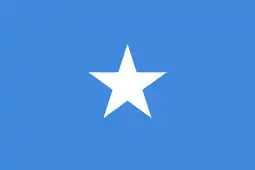 Somalia was a colony of Italy and Britain from the late 1800s to 1960. On July 6, 1960, the Trust Territory of Somaliland (former Italian Somaliland) united as planned with the former British Somaliland to form the Somali Republic (Somalia).
Somalia was a colony of Italy and Britain from the late 1800s to 1960. On July 6, 1960, the Trust Territory of Somaliland (former Italian Somaliland) united as planned with the former British Somaliland to form the Somali Republic (Somalia). South Africa consisted of territories and colonies by various different African and European powers, including the Dutch, the British, and the Nguni. The territory consisting the modern nation was ruled directly by the British from 1806 to 1910; became self-governing dominion of Union of South Africa in 1910.
South Africa consisted of territories and colonies by various different African and European powers, including the Dutch, the British, and the Nguni. The territory consisting the modern nation was ruled directly by the British from 1806 to 1910; became self-governing dominion of Union of South Africa in 1910.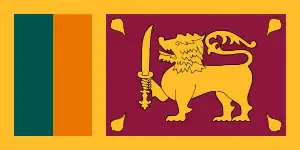 Sri Lanka: a British colony from 1815 to 1948. Known as Ceylon. Was a British Dominion until 1972. Also a Portuguese colony in the 16th-17th centuries, and a Dutch colony in the 17th-18th centuries.
Sri Lanka: a British colony from 1815 to 1948. Known as Ceylon. Was a British Dominion until 1972. Also a Portuguese colony in the 16th-17th centuries, and a Dutch colony in the 17th-18th centuries.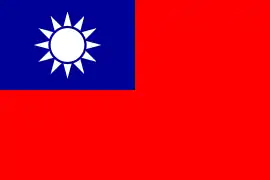 Taiwan has a complex history of colonial rule under various powers, including the Dutch (1624–1662), Spanish (1626–1642), Chinese (1683–1895), and Japanese (1895–1945).[7] The precolonial (pre-1624) inhabitants of Taiwan are the ethno-linguistically Austronesian Taiwanese indigenous peoples, rather than the vast majority of present-day Taiwanese people, who are mostly ethno-linguistically Han Chinese. Twice throughout history, Taiwan has served as a quasi rump state for Chinese governments in exile, the first instance being the Ming-loyalist Kingdom of Tungning (1662–1683) and the second instance being the present-day Republic of China (ROC), which officially claims continuity or succession from the Republic of China (1912–1949), having retreated from mainland China to Taiwan in 1949 during the final years of the Chinese Civil War (1927–1949). The ROC, whose de facto territory consists almost entirely of the island of Taiwan and its minor satellite islands, continues to rule Taiwan as if it were a separate country from the People's Republic of China (consisting of mainland China, Hong Kong, and Macau).
Taiwan has a complex history of colonial rule under various powers, including the Dutch (1624–1662), Spanish (1626–1642), Chinese (1683–1895), and Japanese (1895–1945).[7] The precolonial (pre-1624) inhabitants of Taiwan are the ethno-linguistically Austronesian Taiwanese indigenous peoples, rather than the vast majority of present-day Taiwanese people, who are mostly ethno-linguistically Han Chinese. Twice throughout history, Taiwan has served as a quasi rump state for Chinese governments in exile, the first instance being the Ming-loyalist Kingdom of Tungning (1662–1683) and the second instance being the present-day Republic of China (ROC), which officially claims continuity or succession from the Republic of China (1912–1949), having retreated from mainland China to Taiwan in 1949 during the final years of the Chinese Civil War (1927–1949). The ROC, whose de facto territory consists almost entirely of the island of Taiwan and its minor satellite islands, continues to rule Taiwan as if it were a separate country from the People's Republic of China (consisting of mainland China, Hong Kong, and Macau).- The
 United States was formed from a union of thirteen British colonies. The Colony of Virginia was the first of the thirteen colonies. All thirteen declared independence in July 1776 and expelled the British governors.
United States was formed from a union of thirteen British colonies. The Colony of Virginia was the first of the thirteen colonies. All thirteen declared independence in July 1776 and expelled the British governors.
Current colonies
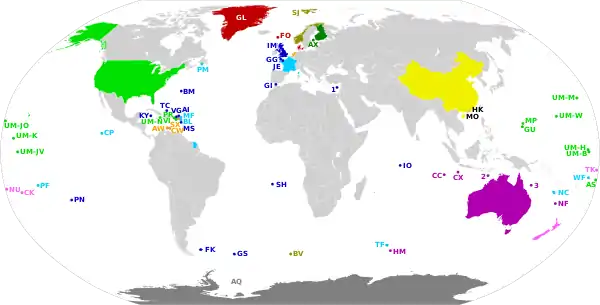
The Special Committee on Decolonization maintains the United Nations list of Non-Self-Governing Territories, which identifies areas the United Nations (though not without controversy) believes are colonies. Given that dependent territories have varying degrees of autonomy and political power in the affairs of the controlling state, there is disagreement over the classification of "colony".
See also
- Colonialism
- Colonization
- Decolonization
- Exploitation colonialism
- Scramble for Africa
- Settler colonialism
- United Nations list of Non-Self-Governing Territories
- Development town
- Border outpost
- Outpost (military)
- Military base – Facility directly owned and operated by or for the military
- Waypoint
- Mountain pass – Route through a mountain range or over a ridge
- Caravanserei
- Stage station
- Mission (station)
- Diplomatic mission – Group of people from one state present in another state to represent the sending state
- Trading post
- Bridgehead
- Crossroads village
- Railway town
- Special economic zone – A geographical region in which business and trade laws are different from the rest of the country
- Entrepôt
- Factory (trading post)
- Free economic zone – Area of a country where companies are very lightly taxed
- Exclusive economic zone – Adjacent sea zone in which a state has special rights
- Free-trade area
- Colony – Territory governed by people from another country, generally with its own subordinate colonial government
- Mill town – Settlement that developed around one or more mills or factories
- Industrial park – Area for development of industry
- Frontier – Political and geographical area near or beyond a boundary
- Frontier thesis – Frederick Jackson Turner's argument that American democracy was built by the American frontier
- Border – Geographic boundary of a political entity or legal jurisdiction
- No-go area – Area where authorities are unable to enforce law or sovereignty
- Terra nullius – International law term meaning territory which has never been the subject of a sovereign nation
- No-mans land
- Human outpost – Artificially-created, controlled human habitats located in environments inhospitable for humans, such as in space
Notes
- Each territory in the United States Minor Outlying Islands is labeled UM- followed by the first letter of its name and another unique letter if needed.
- The following territories do not have ISO 3166-1 codes:
1: Akrotiri and Dhekelia
2: Ashmore and Cartier Islands
3: Coral Sea Islands
References
- "colony". Oxford Advanced Learner's Dictionary. Oxford University Press. 2021. Retrieved 8 January 2021.
1. [...] a country or an area that is governed by people from another, more powerful, country
- James S. Jeffers (1999). The Greco-Roman world of the New Testament era: exploring the background of early Christianity. InterVarsity Press. pp. 52–53. ISBN 978-0-8308-1589-0.
- Puerto Rico:The Trials of the Oldest Colony in the World. By Jose Trias Monge. Yale University Press. 1997.
- Constitution of Argentina, 1860 amd., art. 35.
- De Lario, Damaso; de Lario Ramírez, Dámaso (2008). "Philip II and the "Philippine Referendum" of 1599". Re-shaping the world: Philip II of Spain and his time. Ateneo de Manila University Press. ISBN 978-971-550-556-7.
- In 1521, an expedition led by Ferdinand Magellan landed in the islands, and Ruy López de Villalobos named the islands Las Islas Filipinas in honor of Spain's Prince Philip (later to become Philip I of Castile). During a later expedition in 1564, Miguel López de Legazpi conquered the Philippines for Spain. However, it can be argued that Spain's legitimate sovereignty over the islands commenced following a popular referendum in 1599.[5]
- Tonio Andrade, How Taiwan Became Chinese: Dutch, Spanish, and Han Colonization in the Seventeenth Century, Columbia University Press.
Further reading
- Aldrich, Robert. Greater France: A History of French Overseas Expansion (1996)
- Ansprenger, Franz ed. The Dissolution of the Colonial Empires (1989)
- Benjamin, Thomas, ed. Encyclopedia of Western Colonialism Since 1450 (2006).
- Ermatinger, James. ed. The Roman Empire: A Historical Encyclopedia (2 vol 2018)
- Higham, C. S. S. History Of The British Empire (1921) online free
- James, Lawrence. The Illustrated Rise and Fall of the British Empire (2000)
- Kia, Mehrdad, ed. The Ottoman Empire: A Historical Encyclopedia (2017)
- Page, Melvin E. ed. Colonialism: An International Social, Cultural, and Political Encyclopedia (3 vol. 2003)
- Priestley, Herbert Ingram. (France overseas;: A study of modern imperialism 1938) 463pp; encyclopedic coverage as of late 1930s
- Tarver, H. Micheal and Emily Slape. The Spanish Empire: A Historical Encyclopedia (2 vol. 2016)
- Wesseling, H.L. The European Colonial Empires: 1815-1919 (2015).
External links
![]() Quotations related to colony at Wikiquote
Quotations related to colony at Wikiquote